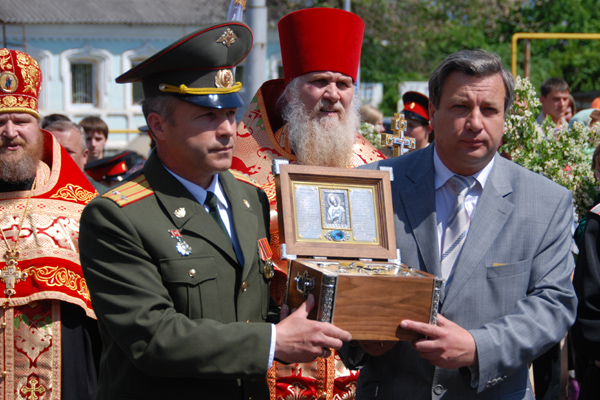Due to the recent tragic events in Ukraine and the ongoing military conflict in the East of the country, Orthodox Christianity has become increasingly important to Western observers and journalists in their attempts to explain the Russian support for the Eastern Ukrainian separatists. Two explanations appear prevalent in Western media, and I believe that there is a transatlantic divide as to the relative persuasiveness of these explanations. One is the democratic explanation, which appears more frequently in US media. This explanation holds that Putin cannot tolerate a pro-Western, democratic Ukraine because the success of this model would endanger his own autocratic regime. Therefore he does everything he can to sabotage the democratic developments in Ukraine. The other explanation, which prevails in European, and in particular in German media, argues that we are confronted with a new dimension of Russian nationalist aggression, an aggression that is fed by ideas of Russian superiority and rooted in Russian Orthodoxy.

Personally, I find the first explanation more convincing, and elsewhere component. However, this article will focus on the second argument: the Orthodox component in present-day Russian military aggression. The German weekly newspapers Die Zeit and Der Spiegel have each dedicated long analytical articles to the religious nationalism that motivates Russian militia in Eastern Ukraine. They have pointed out that the very same men, who, in the light of the available information to this point, are responsible for the hundreds of innocent victims of MH17, are celebrated as heroes by Russian nationalist media such as the newspaper Sawtra. Igor Girkin alias Strelkow and Alexander Borodaj, the self-proclaimed prime-minister of the “People’s Republic of Donetsk“ both stem from a military milieu that is saturated with a Russian Orthodox nationalism more in line with the 19th than to the 21st century. What the German journalists fail to point out in their analyses, however, is that the Russian military Orthodox nationalism is not a recent phenomenon that has made its way from the extremist fringes to the centre of power and public opinion, but actually has concrete historical and ideological roots in the power-centres of the former Soviet Union: the secret service and the military.
It is worthwhile looking the memories of two Russian intellectuals, representatives of the religious and philosophical underground milieu of the late Soviet period, who already early on in the 1990s warned of the militarisation and ideological abuse that was being made of Orthodoxy.
One of these intellectuals was Vladimir Bibikhin (1938-2004), an influential philosopher of his time and translator of Martin Heidegger into Russian. He offers us a first-hand source of how Orthodox ideas were incorporated into the official ideology of the Russian army already during Soviet times. Bibikhin writes: “Those in power started to look for ideological alternatives to Marxism early”. As early as 1973, he recalls that political strategists were starting to consider Orthodox patriotism an easy way out of an ideological dead end. In search of an ideological underpinning for the Soviet army, the state organs busied themselves with the elaboration of ideological alternatives, and to this end even employed “homeland dissidents”, as Bibikhin calls himself and his fellows. These scholars translated and reviewed otherwise forbidden literature of Russian religious philosophy of the late 19th and early 20th century, their texts being published in a series imprinted DSP (“dlya sluzhebnogo pol’zovaniya”, “for administrative use”), in numbered and limited editions that would be carefully distributed amongst state officials. Since the authorities imagined that Orthodoxy could provide a particularly useful ideological background for patriotism, research in this field was intensified. Bibikhin recalls that at the end of the 1970s religion was a particularly well-financed part of the DSP series. These studies remained on a superficial, ideologically correct level, he writes – a level which merely reflected the parlous state of religion in the country as a whole.
A second memory is offered by Sergej Khoruzhy (born 1941), who 1994 published an article he original wrote in 1988, with the title O Maroderakh (transl. The Looters) and in which he protests against the superficial re-appropriation of religious philosophers during the late-Soviet and Yeltsin-period. He called “looters” those who took from a cherished tradition only those bits and pieces that could be used so as to underpin Russian superiority rooted in Orthodoxy. His memory is another indicator for how communist ideologues in the 1990s just switched sides, turning themselves into staunch Orthodox.
Religious Orthodox fundamentalism in the Russian army milieu is not at all a novelty for observers of the Russian Orthodox Church and Russian politics. There is also clear evidence that the Moscow Patriarchate, while officially trying to stay aloof, has done little to contain its spread. The archpriest Dmitry Smirnov, a well-known anti-liberal hardliner and Orthodox fundamentalist, was until recently delegated to the relations between the Church and the Russian army. The Church-sponsored, non-governmental organization “World Russian People’s Council” is another place where Orthodox fundamentalist ideas are voiced frequently. And some readers may recall the 2008 film “The fall of an empire – The lesson of Byzantium” by Archimandrite Tikhon Shevkunov, which argued that Orthodox Russia had to withstand the West or otherwise it would perish like the Byzantine Empire. Anecdotal evidence claims that the army organized viewings of this film for recruits. Tikhon Shevkunov has also been said to be Putin’s spiritual advisor.
The Russian Orthodox nationalist ferment in the circles that have supported the pro-Russian separatists in Ukraine is a phenomenon with deep roots. There is also evidence that it enjoys considerable support among ordinary Orthodox believers, even though it has not become the official ideology of the Moscow Patriarchate. The religious-ideological charged nature of the conflict makes it even harder to imagine solutions to the crisis in the near future.
Kristina Stoeckl is Research Director at the IWM (Project: Orthodox Christianity and Politics: Multiple Secularisms, Liberal Norms and Traditional Religion) as well as an APART Fellow of the Austrian Academy of Sciences at the Department of Political Sciences at the University of Vienna.